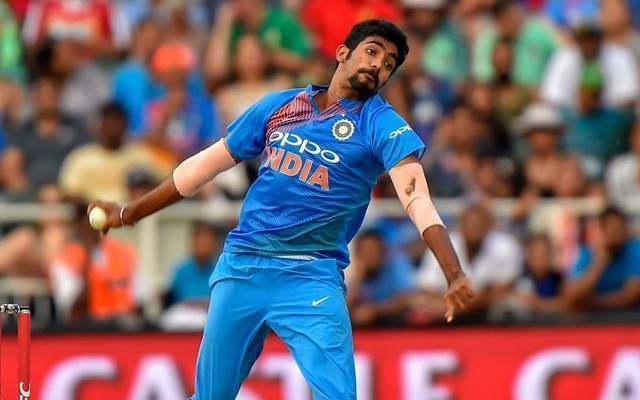
Indian bowlers with the most wickets in an ODI World Cup
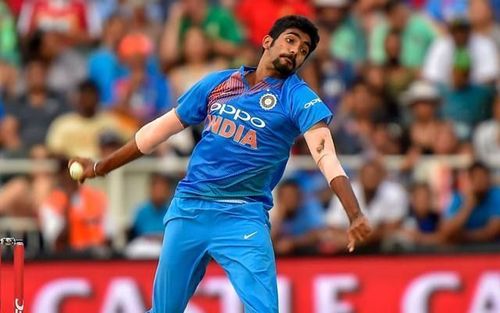
The World Cup is the most prestigious tournament in international cricket. Australia is the most successful team in the history of the tournament, having won the title on 5 occasions. India and West Indies are the next best teams, with 2 World Cup trophies each in their kitty.
Glenn McGrath is the most successful bowler in ODI World Cups, with 71 career wickets to his credit. Zaheer Khan and Javagal Srinath have both accounted for 44 wickets in World Cups, the most by any Indian bowler. Mitchell Starc holds the record for the most wickets in a single World Cup, with 27 scalps to his name in the 2019 World Cup.
On that note, let us have a look at the Indian bowlers who have picked up the most wickets in a single ODI World Cup.
Most wickets by an Indian bowler in an ODI World Cup
#T2: Zaheer Khan - 18 wickets (2003 World Cup)
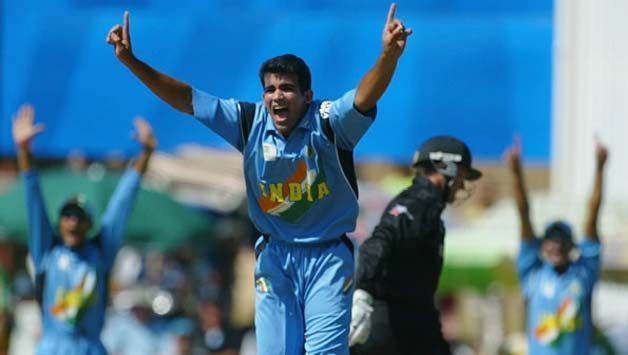
Zaheer Khan scalped 18 wickets at an average of 20.77 in the 2003 World Cup. This is the joint second-most wickets taken by an Indian in an ODI World Cup.
Khan started his World Cup campaign with a sole wicket in India's opening encounter against the Netherlands, getting Bas Zuiderent out caught by Virender Sehwag at 2nd slip. He went wicket-less in the next match against Australia, with India being trounced by 9 wickets.
The left-arm pace bowler took Zimbabwe's last two wickets, Brian Murphy and Douglas Hondo, in India's 83-run win against the African nation. In the next match against Namibia, he made the initial breakthroughs, bagging the first 2 wickets to fall.
Khan had Marcus Trescothick caught by Sachin Tendulkar and trapped James Anderson plumb in front, as he grabbed another couple of wickets against England. The next match against Pakistan again saw him scalp 2 wickets- he first castled Taufeeq Umar and then had Younis Khan caught by Dinesh Mongia.
The Baroda seam bowler could not add to his tally in India's first Super-six encounter against Kenya. He again had a couple of wickets to his name in India's next Super-six match against Sri Lanka. Mahela Jayawardene and Russel Arnold were both trapped plumb in front as India outplayed the Lankans to win by 183 runs.
New Zealand faced the brunt of Khan's trickery in India's final Super-six encounter, with 4 Kiwi batsmen losing their wickets to him. The left-arm pacer started the demolition by getting rid of Craig McMillan and Nathan Astle with the second and third deliveries of the match. He then accounted for Brendon McCullum and Chris Harris to break the backbone of the Kiwi batting line-up.
Khan got the better of 3 Kenyan batsmen - Ravindu Shah, Hitesh Modi and Martin Suji- in the semi-finals, while conceding just 14 runs.
Unfortunately, he could not replicate these performances in the final encounter against Australia. Khan had a horror opening over and could never regain his confidence. He conceded 67 runs in his 7 overs as Australia thrashed India by 125 runs to retain the World Cup title.
Although Zaheer Khan could not deliver to his potential in the finals, his 18 wickets played a huge role in India reaching the summit clash.
#T2: Jasprit Bumrah - 18 wickets (2019 World Cup)

Jasprit Bumrah was India's most potent bowler at the 2019 World Cup. Just like Zaheer in 2003, he also scalped 18 wickets but at a slightly better average of 20.61.
Bumrah made a bright start to the World Cup, getting both Hashim Amla and Quinton de Kock caught in the slips within the first 6 overs in India's first match against South Africa. He went one better, dismissing three Australian batsmen - Usman Khawaja, Nathan Coulter-Nile and Pat Cummins- in India's second group stage encounter.
The Gujarat pacer went wicket-less in India's match against Pakistan, after the previous encounter against New Zealand had been washed out. He broke Afghanistan's momentum in the next match, dismissing Rahmat Shah and Hashmatullah Shahidi in the same over.
Bumrah again bagged a couple of wickets against West Indies, dismissing Carlos Brathwaite and Fabian Allen off consecutive deliveries. His dismissal of Ben Stokes in the final over was his solitary wicket against England, a match India lost by 31 runs.
The menacing Bumrah rocked the timber of 4 Bangladeshi batsmen - Mosaddek Hossain, Sabbir Rahman, Rubel Hossain and Mustafizur Rahman in India's penultimate group stage match. He followed that by scalping 3 wickets - Dimuth Karunaratne, Kusal Perera and centurion Angelo Mathews- in India's final group stage clash against Sri Lanka.
Bumrah had Martin Guptill caught at slip by Virat Kohli, his solitary wicket in the semi-final encounter against New Zealand. Although India managed to restrict the Kiwis to 239/8 in their allotted 50 overs, they fell short of the target by 18 runs to bow out of the tournament.
Even though India crashed out at the penultimate hurdle, Jasprit Bumrah left a mark with his haul of 18 wickets at the World Cup.
#T2: Roger Binny - 18 wickets (1983 World Cup)
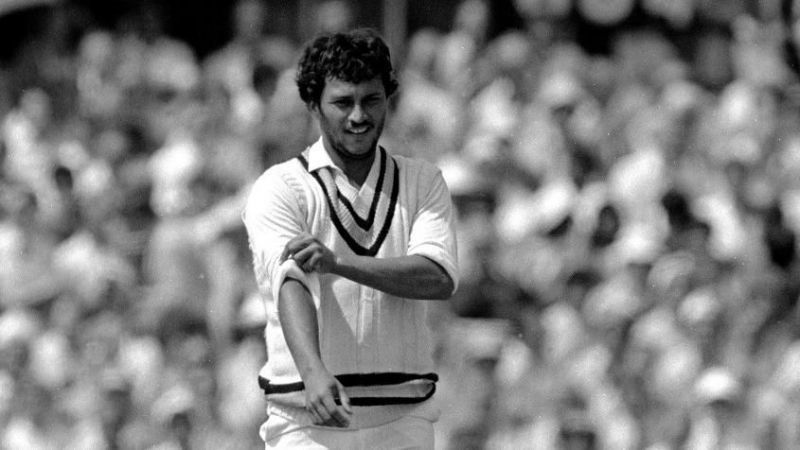
Roger Binny was the most successful bowler at the 1983 World Cup. His 18 wickets came at an average of 18.66, better than those of Bumrah and Khan in the 2019 and 2003 World Cups respectively.
Binny set the benchmark in the first match itself, scalping 3 West Indian wickets. His dismissals of Viv Richards, Clive Lloyd, and Jeff Dujon helped India pull off an upset victory over the Caribbeans. He accounted for another couple of wickets in India's next group stage match against Zimbabwe.
Allan Border was the Karnataka swing bowler's solitary wicket in India's next encounter against Australia. He again got the better of 3 West Indian batsmen - Faoud Bacchus, Jeff Dujon, and Andy Roberts- in India's repeat encounter against the favourites.
India's next encounter against Zimbabwe is remembered for Kapil Dev's swashbuckling innings. But Binny also played his part to perfection, by first contributing 22 runs in a crucial partnership of 60 runs, and then scalping the wickets of two Zimbabwe batsmen.
The medium-pacer ran through the Australian batting order in India's final group stage match. He got rid of 4 Australian batsmen - Graeme Wood, Graham Yallop, David Hookes and Tom Hogan- as India defeated the Kangaroos by 118 runs to qualify for the semi-finals.
Binny provided the initial breakthroughs in the semi-final encounter by dismissing both the England openers, Chris Tavare and Graeme Fowler. This helped India restrict the Englishmen to a score of 213, which they chased easily with 6 wickets in hand.
Even in the final, Binny took the crucial wicket of captain Clive Lloyd as the Indian bowlers put up an inspired display to defend a score of 183 runs against the mighty West Indies.
Roger Binny's 18 wickets, the most by any bowler at the 1983 World Cup, played a significant role in India winning its maiden World Cup.
#T2: Umesh Yadav - 18 wickets (2015 World Cup)
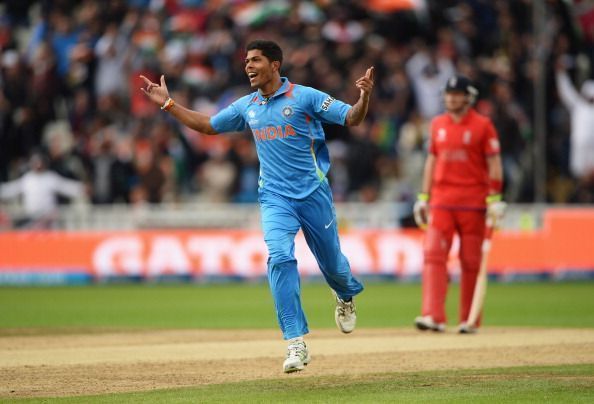
Umesh Yadav was the most successful Indian bowler at the 2015 World Cup. His average of 17.83 is the best among the four Indian bowlers who have taken 18 wickets at a single World Cup.
Yadav dismissed Ahmed Shehzad and Sohaib Maqsood in the space of 3 deliveries to put the brakes on Pakistan's run chase in India's first group match. He went wicket-less in the next match against South Africa, but the other Indian bowlers stepped up to dismiss the Proteas for just 177 runs.
The Vidarbha pacer scalped a couple of wickets in India's next encounter against the UAE, with the gulf nation getting bowled out for 102 runs. He bagged another 2 wickets in the following match against West Indies, castling Denesh Ramdin and accepting a return catch from Jerome Taylor.
George Dockrell was Yadav's solitary victim in India's penultimate group stage match against Ireland. The right-arm quick claimed 3 wickets in India's final group stage clash against Zimbabwe, dismissing Hamilton Masakadza at the top of the order, and then Regis Chakabva and Tendai Chatara to close out the innings.
Yadav was at his best in the quarter-final encounter against Bangladesh. Tamim Iqbal, Mushfiqur Rahim, Sabbir Rahman, and Rubel Hossain were his 4 victims as India won the match by 109 runs to make it through to the semi-finals.
Although Yadav bagged another 4 wickets in the semi-final encounter against Australia, they came at the cost of 72 runs in 9 overs. His dismissals of David Warner, Aaron Finch, Steven Smith, and James Faulkner could not stop Australia from posting an imposing total of 328/7 on the board.
India folded for 233 runs to crash out of the World Cup. But the Indian bowlers, including Umesh Yadav with 18 wickets in the tournament, had left an indelible mark at the World Cup.
#1: Zaheer Khan - 21 wickets (2011 World Cup)
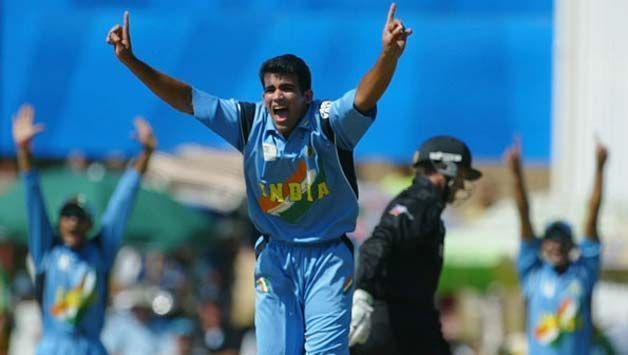
Zaheer Khan holds the Indian record for the most wickets at a single World Cup edition. His tally of 21 wickets at the 2011 World Cup came at an average of 18.76.
Khan set the ball rolling with a couple of wickets in India's first group stage match against Bangladesh, with Mushfiqur Rahim and Abdur Razzak being his victims. He bowled a sensational spell in the middle overs in India's next group stage encounter. Khan got rid of Ian Bell, Andrew Strauss, and Paul Collingwood in quick succession, just when England was poised to chase down India's score of 338 runs.
The wily left-arm pacer picked another 3 wickets in India's next group stage clash against Ireland. He first dismissed Paul Stirling and Ed Joyce at the top of the order, and then got rid of George Dockrell towards the fag end of the innings. He dismissed another trio of batsmen - Bas Zuiderent, Peter Borren and Mudassar Bukhari- in the following match against the Netherlands.
Graeme Smith was his only victim in India's penultimate group stage match against South Africa, the only match India lost at the World Cup. Khan registered another 3-wicket haul in India's final group stage encounter against West Indies, sending Devon Smith, Ramnaresh Sarwan, and Sulieman Benn back to the pavilion.
The Baroda seam bowler again bagged a couple of wickets in the middle overs in the quarter-finals against Australia. He rearranged Michael Hussey's furniture, and held a return catch of Cameron White to halt Australia's progress.
Khan dismissed the attack-minded Kamran Akmal after Pakistan had got off to a brisk rate while chasing India's 260/9 in the semi-final clash. He came back to have Misbah-ul-Haq caught at long-on to put the final nail in the coffin.
The lynchpin of the Indian bowling line-up bowled an outstanding first spell in the final against Sri Lanka, conceding just 6 runs while also claiming the wicket of Upul Tharanga. He was again terrific in the middle overs, getting the better of Chamara Kapugedera with a well-disguised slower one.
Although Khan got some stick in the final overs, his superb bowling in the initial and middle stages of the innings helped India restrict Sri Lanka to a score of 274/6. Gautam Gambhir and MS Dhoni then put together a match-defining 109-run partnership as India became the World Cup champions for the second time.
While all the squad members had played their part, Zaheer Khan was undoubtedly the leader of the bowling attack. With 21 wickets to his name, he finished as the joint highest wicket-taker in the 2011 World Cup.